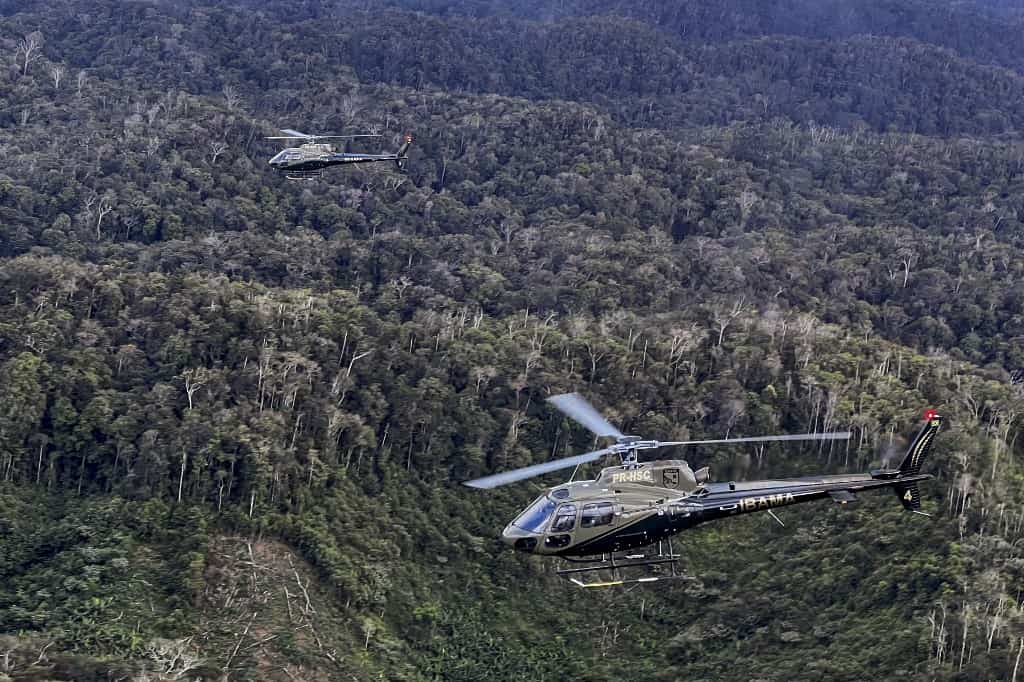Her grandfather used to protect the indigenous territory in the Brazilian state of Rondônia with bow and arrow. But today the weapon of many young indigenous people like activist Txai Suruí against illegal logging and mining in the Amazon is technology.
This 26-year-old Brazilian is one of the stars of Web Summit Rio, the largest annual global technology conference that this week brings together for the first time outside Europe more than 20,000 entrepreneurs from large technology companies, start-ups and investors from around the world.
“Today for us technology is a weapon (…) we use technology and ancestral knowledge as a form of resistance, of protection of our territory,” he tells AFP on the sidelines of the conference.
With video cameras, drones, GPS, cell phones and social networks, a group of young people from her village monitors land invasion and denounces them through an app, explains Txai, coordinator of the Kanindé Ethno-environmental Defense Association, which works with 21 indigenous peoples of the Amazon.
“But technology can be used for evil,” she warns. “The same satellite we use to protect our territory is used by invaders to destroy. On Facebook, indigenous land is being sold.”
Some 800,000 indigenous people live in Brazil, most of them in reserves that occupy 13.75% of the territory, according to official data.
Family of activists
Txai follows in the footsteps of her parents, activists who fought illegal loggers and received death threats.
The young woman is executive producer of the documentary “O Territorio” (The Territory) about the struggle of the Uru-eu-wau-wau people and her mother, Ivaneide Bandeira, against land invasion in Rondônia (north).
Her father, the chief Almir Suruí, whom she defines as “a visionary”, was the first to appeal to technology “to save the forest”: in 2007, he knocked on the door of Google in California and thus the cultural map of the Paiter Suruí was created on Google Earth, she recalls.
He was also the first to lead a Brazilian indigenous people to work with the carbon market, an initiative that today is on hold while it is discussed in more depth, “because there are people who want to take advantage of it”.
Barefoot, with her face painted with black lines and a crown of multicolored feathers adorning her long hair, Txai Suruí urges businessmen to visit the forest.
“We need people who work with technology to reconnect with nature (…) To those who tell me they want to help me with new applications, I say: come and meet us and see what we need,” says the activist, who is studying law.
There are still prejudices
The young woman, who participated in the UN conference on climate change COP26 in Glasgow in 2021, regrets being the only indigenous person at the Web Summit Rio.
“There is still a lot of prejudice, a lot of racism. We talk a lot about democracy, but what kind of democracy is this, where you don’t see yourself reflected?” she says.
The government of Luiz Inácio Lula da Silva, which took office four months ago, has made the fight against deforestation a priority. Last week Lula signed decrees demarcating six new indigenous territories, the first since 2018.
The new reserves guarantee indigenous people exclusive use of natural resources and scientists argue that these areas act as a brake on deforestation in the Amazon.
Under the government of Jair Bolsonaro (2019-2022), who promised before coming to power “not to cede an inch” of land to indigenous people, deforestation increased 75% compared to the previous decade.
“The look changed (…) but we know we have a long way to go,” says Txai. “My role is to demand, to pressure, there are still many territories to demarcate”.
“We have to strengthen the National Foundation of Indigenous Peoples (Funai), the Ministry of Indigenous Peoples, the Ministry of Environment,” she adds.
For the young woman, the biggest challenge comes from the National Congress “very conservative, more so than the last government”.
On a global level, she asks the world to understand that talking about climate change is not only about the economy. “We are almost at a point of no return (…) We have to stop thinking only about the economy and think about people”, she assures.






